Three takeaways from a communications internship in conservation
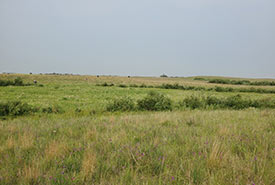
Big Valley planting site (Photo by NCC)
It’s hard to believe that the summer of 2021 went by so quickly. I was hired as a communications and engagement intern with the Nature Conservancy of Canada (NCC) in the spring, working alongside Saskatchewan staff, to tell stories of...
Mouse-ear hawkweed: Friend or foe?
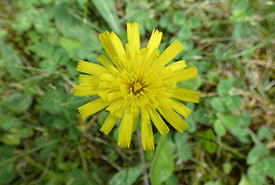
Mouse-ear hawkweed flower (Photo by mhalsted, CC BY-NC 4.0)
A species is considered invasive or alien when it is located outside its natural distribution and threatens humans and/or the environment. There aren’t a lot of clear answers about the impact of certain invasive species and the problem is...
What’s that stuff on my tree? A guide to Manitoba’s lichens
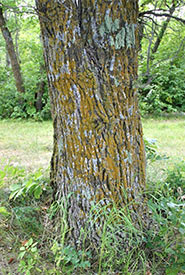
Lichen on tree (Photo courtesy of Manitoba Museum)
If you’re an observant person, you may have noticed colourful things growing on Manitoba’s trees and rocks. Although some of these organisms are mosses (especially near the base), they are more likely to be lichens. Bright orange...
The greatest tool in tackling climate change needs our help: nature
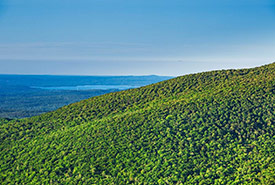
Green Mountains, Sutton, Quebec (by Mark Tomalty)
As we mark National Forest Week, (September 19–25), let’s consider what our forests provide. The short answer is: much more than we realize. The roots of trees, from BC’s hulking cedars to PEI’s flaking black birches, reach...
Going paperless: Introducing a new data collection tool
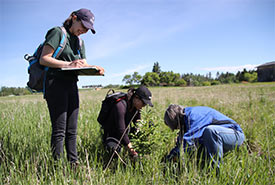
NCC intern and volunteers conducting a tree survey at Upper North Saskatchewan River Basin (Photo by NCC)
Over the past few years, the Nature Conservancy of Canada’s (NCC’s) Saskatchewan Region has used pen and paper to complete their rangeland health assessments. Rangeland health assessments are score-based sheets that are used to monitor...
Discoveries in little-known fungi: Adventures in looking at lichens
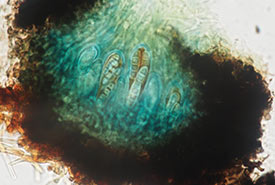
Opegrapha parmeliiperda, cross section of one fruiting body showing four-celled spores developing inside spore sacs; blue colour result of treatment with potassium hydroxide followed by Lugol’s iodine solution. (Photo courtesy of Kendra Driscoll)
I used to think that scientists understood the basics about most living things on Earth, that new species were all discovered long ago by people like Linnaeus and Darwin. Maybe you could find new species in the most remote corners of the planet,...
Grasslands, close-up
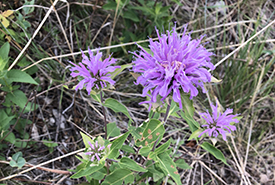
Western bergamot (Photo by NCC)
As a conservation intern with the Nature Conservancy of Canada (NCC) this past summer, I have had the wonderful opportunity to explore the land that we help conserve here in Saskatchewan. Growing up in this province, I developed a love for the...
How the pandemic turned me into an urban gardener
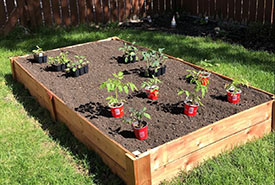
Seedlings in pots layed out on the veggie bed (Photo by Christine Beevis Trickett/NCC staff)
It’s amazing how slowing down and staying put in a place helps you connect with the life around you. I used to have quite a busy travel schedule, moving back and forth across the country several times a year to visit family or for work...
Remembering his cedar canoe
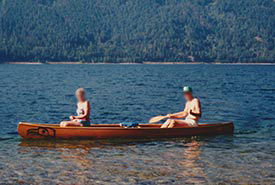
My grandfather's canoe, his pride and joy. Our neighbours out for a paddle in the canoe (Photo courtesy of Asha Swann/NCC intern)
The cedar canoe hanging from my grandparents’ garage roof stands out for good reason. A dusty photo album in the basement with “1993” scrawled in my grandmother’s cursive tells me that this canoe is older than I am, though...
A case of mistaken identity: Goldenrod and ragweed
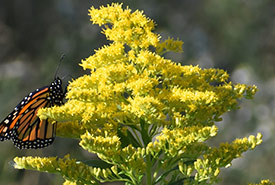
Monarch butterfly on Canada goldenrod (Photo by Peter Jessen, CC BY-NC 4.0)
I count myself fortunate when the change of seasons doesn’t bring about a runny nose, itchy eyes, headache and coughing, among other symptoms brought about by pollen (a fine powder produced by plants for sexual reproduction). Some pollen is...

